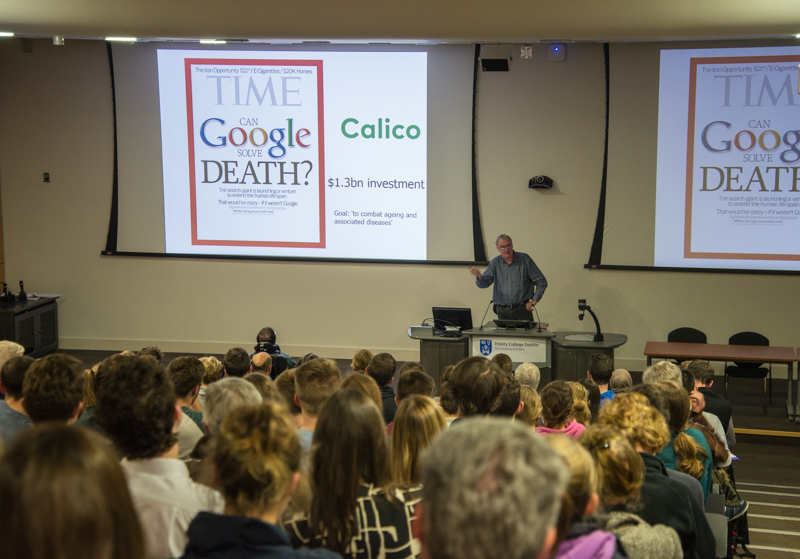
In the Stanley Quek theatre last night in the Trinity Biomedical Sciences Institute (TBSI), Luke O’Neill, Professor of Immunology and Biochemistry in Trinity and former director of the TBSI, addressed the claim by Mark Zuckerberg that we should strive to cure all diseases. Zuckerberg has since donated $3 billion towards this cause, and hopes to see an advancement in the near future towards the treatment of a wide range of currently incurable ailments. O’Neill began the talk by saying that the idea that we may be able to cure all diseases may seem “stupid”, but in reality, it’s very much “in our sights”.
He went on to jokingly say that if this was was ever to be achieved, he’d be out of a job, but of course, Mark Zuckerberg would give him $3 billion for being right that the immune system was the key to curing all diseases.
O’Neill stated that he sincerely believes that the immune system is the path to curing all illnesses – considering O’Neill is an immunologist, this was perhaps unsurprising. Yet, throughout the talk, O’Neill set about convincing his audience of the immense value in researching our immune system.
He began by telling the audience that out of the 7,000 distinct diseases that exist today, only 500 are treatable. Progress, he emphasised, can only be made through scientists and medics working together.
Those familiar with O’Neill will be aware of his dry sense of humour. The talk, which ostensibly was based around immunology and disease, was accompanied by a range of cartoons and jokes. Indeed, O’Neill used the talk as an opportunity to take occasional swipes at government funding, homeopathy and the “morons” who don’t believe in vaccines.
Discussing some of the most important discoveries ever made, O’Neill ranked contraception fifth. He pointed out the wonderful irony that of Ireland, at a time when the country was still strictly Catholic and contraception was itself illegal, was the biggest exporter of contraception in the world, producing 1,250g of the pill each day.
Drugs, of course, are the cornerstone of modern medicine. O’Neill pointed to the 1,435 drugs currently in existence that had been approved by the US’s Food and Drug Administration (FDA). Going through a brief and potted history of drugs, O’Neill informed the audience that the first drug ever depicted in history – as part of an Egyptian script – was cannabis.
The first drug ever successfully synthesised, he continued, was aspirin – still in use today. The second? Heroin. Yet since the heyday of drug discovery, the number of newly drugs has fallen considerably. Only eight new drugs, for instance, were approved by the Food and Drug Administration in 2013. O’Neill said we need to expand on this number, and develop drugs that vary in their targets, and hopefully, will help cure more diseases.
As an example of how advancements in drugs have changed the lives of millions, O’Neill described how certain inhibitors have been found to double the survival rates of patients with lung cancer. These drugs block the T-cell inhibitor made by tumours, and allow the T-cells to fight the tumour. The signs around the drug have been promising, and have helped contribute to a doubling of survival rates among patients.
Finally, O’Neill posed the question: “What diseases need new medicines the most?”. Neuropsychiatric diseases are desperately in need of new treatments, O’Neill said, though he pointed to the reluctance of pharmaceutical companies to get too involved in this area. He also referenced the worrying thought that, as the global population gets older and starts living for longer, there are still no cures for Alzheimer’s disease or Parkinson’s disease.
The talk, which might have been depressing, end on a positive note. O’Neill, referencing the progress his own research was making, encouraged the audience to value the importance of humour. Ending on two cartoons – one involving Viagra and the game of quoits – O’Neill reiterated, with what might be a little bias, the value of the immune system in potentially ending some of the biggest diseases facing the world.






